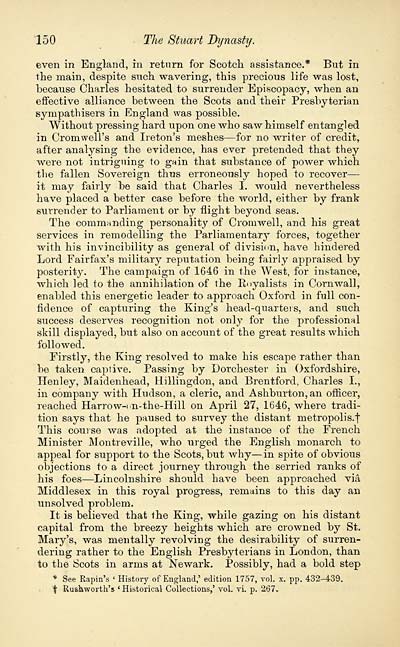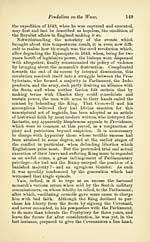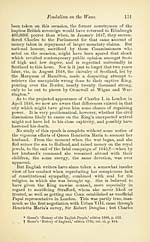Stuart dynasty
(170) Page 150
Download files
Complete book:
Individual page:
Thumbnail gallery: Grid view | List view

150 The Stuart Dynasty.
even in England, in return for Scotch assistance.* But in
the main, despite such wavering, this precious life was lost,
because Charles hesitated to surrender Episcopacy, when an
effective alliance between the Scots and their Presbyterian
sympathisers in England was possible.
Without pressing hard upon one who saw himself entangled
in Cromwell's and Ireton's meshes — for no writer of credit,
after analysing the evidence, has ever pretended that they
were not intriguing to gain that substance of power which
the fallen Sovereign thus erroneously hoped to recover —
it may fairly he said that Charles I. would nevertheless
have placed a better case before the world, either by frank
surrender to Parliament or by flight beyond seas.
The commanding personality of Cromwell, and his great
services in remodelling the Parliamentary forces, together
with his invincibility as general of division, have hindered
Lord Fairfax's military reputation being fairly appraised by
posterity. The campaign of 1646 in the West, for instance,
which led to the annihilation of the Royalists in Cornwall,
enabled this energetic leader to approach Oxford in full con-
fidence of capturing the King's head-quarters, and such
success deserves recognition not only for the professional
skill displayed, but also on account of the great results which
followed.
Firstly, the King resolved to make his escape rather than
be taken captive. Passing by Dorchester in Oxfordshire,
Henley, Maidenhead, HLillingdon, and Brentford, Charles I.,
in company with Hudson, a cleric, and Ashburton, an officer,
reached Harrow-on- the-Hill on April 27, 1646, where tradi-
tion says that he paused to survey the distant metropolis.!
This course was adopted at the instance of the French
Minister Montreville, who urged the English monarch to
appeal for support to the Scots, but why — in spite of obvious
objections to a direct journey through the serried ranks of
his foes — Lincolnshire should have been approached via
Middlesex in this royal progress, remains to this day an
unsolved problem.
It is believed that the King, while gazing on his distant
capital from the breezy heights which are crowned by St.
Mary's, was mentally revolving the desirability of surren-
dering rather to the English Presbyterians in London, than
to the Scots in arms at Newark. Possibly, had a bold step
* See Rapin's ' History of England,' edition 1757, vol. x. pp. 432-439.
\ Rushworth's ' Historical Collections,' vol. vi. p. 267.
even in England, in return for Scotch assistance.* But in
the main, despite such wavering, this precious life was lost,
because Charles hesitated to surrender Episcopacy, when an
effective alliance between the Scots and their Presbyterian
sympathisers in England was possible.
Without pressing hard upon one who saw himself entangled
in Cromwell's and Ireton's meshes — for no writer of credit,
after analysing the evidence, has ever pretended that they
were not intriguing to gain that substance of power which
the fallen Sovereign thus erroneously hoped to recover —
it may fairly he said that Charles I. would nevertheless
have placed a better case before the world, either by frank
surrender to Parliament or by flight beyond seas.
The commanding personality of Cromwell, and his great
services in remodelling the Parliamentary forces, together
with his invincibility as general of division, have hindered
Lord Fairfax's military reputation being fairly appraised by
posterity. The campaign of 1646 in the West, for instance,
which led to the annihilation of the Royalists in Cornwall,
enabled this energetic leader to approach Oxford in full con-
fidence of capturing the King's head-quarters, and such
success deserves recognition not only for the professional
skill displayed, but also on account of the great results which
followed.
Firstly, the King resolved to make his escape rather than
be taken captive. Passing by Dorchester in Oxfordshire,
Henley, Maidenhead, HLillingdon, and Brentford, Charles I.,
in company with Hudson, a cleric, and Ashburton, an officer,
reached Harrow-on- the-Hill on April 27, 1646, where tradi-
tion says that he paused to survey the distant metropolis.!
This course was adopted at the instance of the French
Minister Montreville, who urged the English monarch to
appeal for support to the Scots, but why — in spite of obvious
objections to a direct journey through the serried ranks of
his foes — Lincolnshire should have been approached via
Middlesex in this royal progress, remains to this day an
unsolved problem.
It is believed that the King, while gazing on his distant
capital from the breezy heights which are crowned by St.
Mary's, was mentally revolving the desirability of surren-
dering rather to the English Presbyterians in London, than
to the Scots in arms at Newark. Possibly, had a bold step
* See Rapin's ' History of England,' edition 1757, vol. x. pp. 432-439.
\ Rushworth's ' Historical Collections,' vol. vi. p. 267.
Set display mode to:
![]() Universal Viewer |
Universal Viewer | ![]() Mirador |
Large image | Transcription
Mirador |
Large image | Transcription
Images and transcriptions on this page, including medium image downloads, may be used under the Creative Commons Attribution 4.0 International Licence unless otherwise stated. ![]()
| Histories of Scottish families > Stuart dynasty > (170) Page 150 |
|---|
| Permanent URL | https://digital.nls.uk/94819806 |
|---|
| Description | A selection of almost 400 printed items relating to the history of Scottish families, mostly dating from the 19th and early 20th centuries. Includes memoirs, genealogies and clan histories, with a few produced by emigrant families. The earliest family history goes back to AD 916. |
|---|

